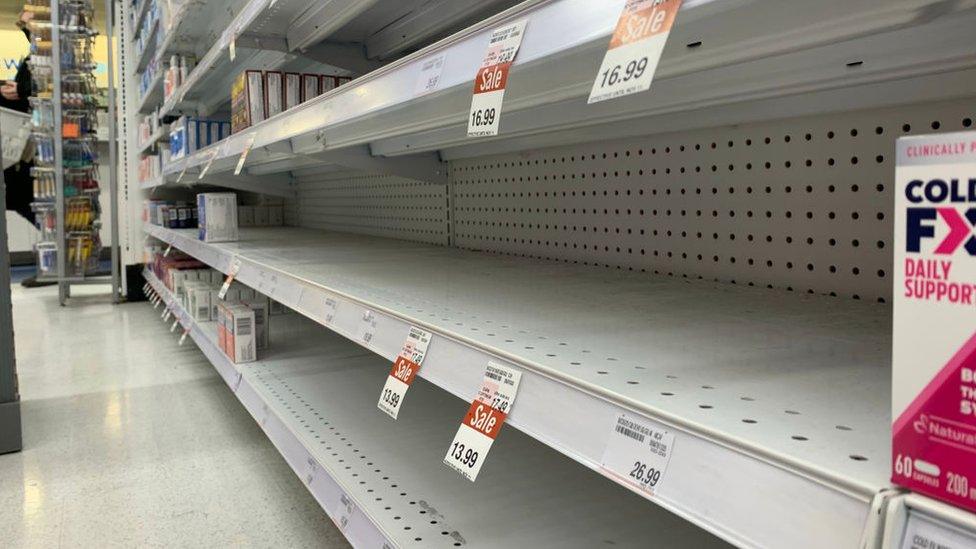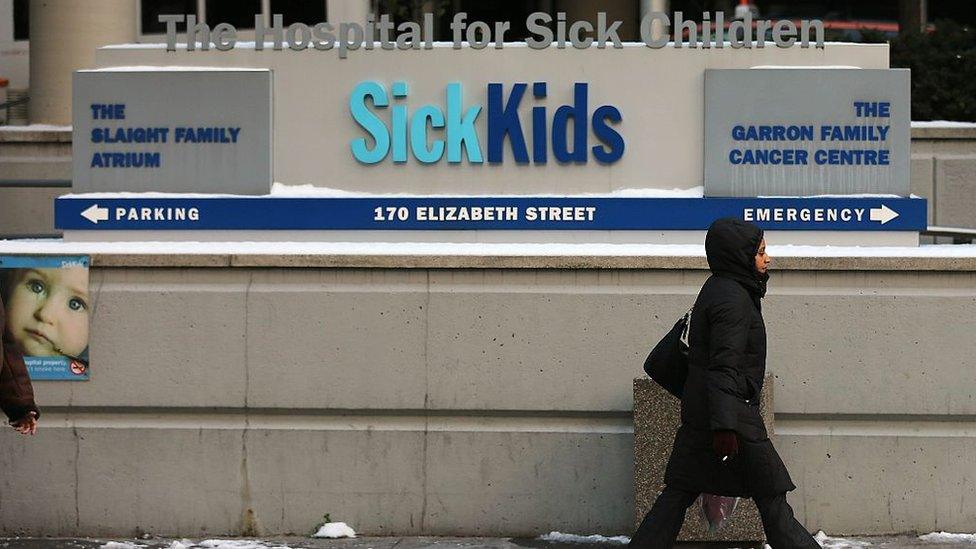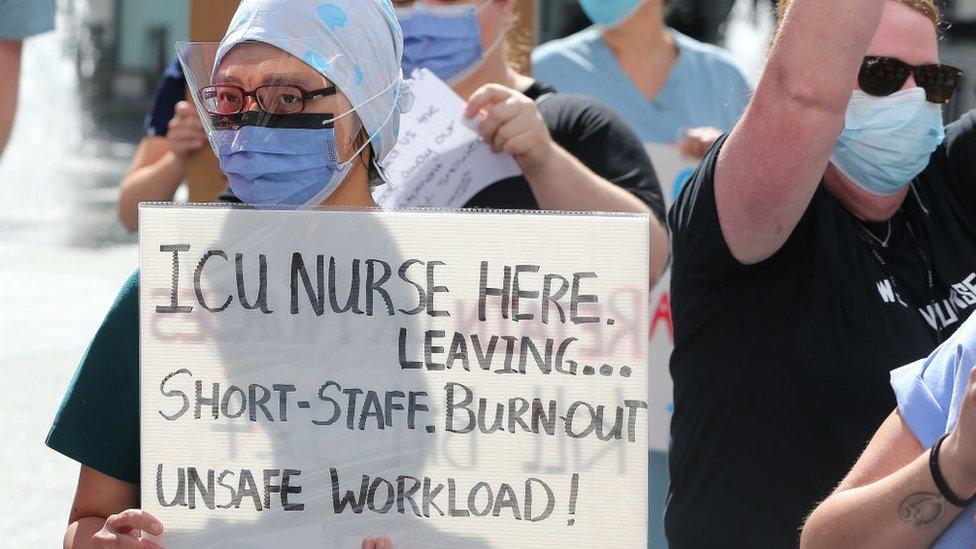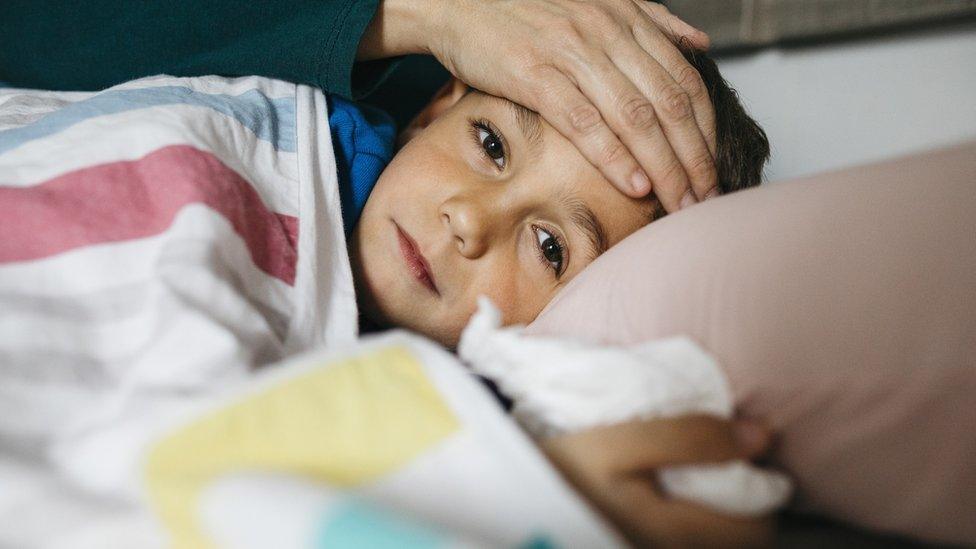RSV and flu: Parents 'panic' amid Canada shortage of children’s pain meds
- Published

Children's pain medication has been in short supply in Canada for months
In early November, as temperatures in Toronto, Canada fell below freezing, Natalia Timofeeva's eight-year-old son, Alex, came down with a fever.
The fever itself was pretty routine, said Ms Timofeeva, a 47-year-old single mother living in Canada's biggest city. But this time, when Alex's temperature climbed - reaching 40C (104F) - she ran out of medicine.
Ms Timofeeva went to a Shoppers Drug Mart - the largest pharmacy chain in the country - and found empty shelves.
"They explained to me that the entire chain doesn't have Tylenol," she said. "And they said don't even try other drugstores, because they all have the same supplier."
For months, Canada has faced a shortage of children's ibuprofen and acetaminophen (Advil and Tylenol), leaving parents desperate and without medication amid a nationwide surge of respiratory viruses.
This week, Canada's federal health agency said it had secured a foreign supply of children's acetaminophen to help curb demand. But the agency would not say when, exactly, these shipments will arrive or how much will be delivered, doing little to calm parents with the worst of flu season still to come.
Surge in RSV, flu and Covid
Observers say the intense demand for painkillers has been spurred by an unusual jump in viral infections among children - primarily coronavirus, influenza and respiratory syncytial virus (RSV), all three of which produce fevers in young children.
"We're seeing this rapid rise in kids getting sick," said Kelly Grindrod, a licenced pharmacist and professor at the University of Waterloo.
Part of the jump, Dr Grindrod said, is because Covid restrictions helped limit the spread of other viral illnesses, meaning a large cohort of children who have not been exposed before are getting sick all at once.
"Respiratory virus season is challenging anyway, and now it seems to be even worse," she said.
Parents have been left to scramble for the dwindling supply, relying on networks of friends and family to track down available medication before the shelves are cleared out.
In recent weeks, Toronto Mommies, a parenting Facebook group with more than 23,000 members, has been dominated by pleas for the medication, as well as posts from anyone who has a "sighting" of one of the drugs.
"There's panic, there's fear and there's worry," said Alisa Fulshtinsky, the group's founder. "And parents don't know how long it's going to last."
For Ms Timofeeva, the hunt for medication involved a frenzied search of six drug stores over two days.
"It was just helplessness," she said. "And then your mind keeps looking: 'What else can I do?'"
She eventually found a specialised pharmacist who could compound the drugs and make her a generic version.
Still, it's an expensive solution. Compounded products can cost C$60 to $100 ($45 to $75; £38 to £64) - compared to around C$10 for an average box - and typically expire within two weeks.

Children's hospitals have been overwhelmed with patients
The medication shortage has also put added strain on an already overwhelmed children's health system. Emergency rooms and intensive care systems have been running over capacity for weeks, and wait times can reach 13 hours.
At the largest paediatric hospital in the country, Toronto's SickKids, surgeries last week were limited to prioritise urgent procedures as its ICU ran at 127% capacity for several days in a row, with about half of intensive care patients on a ventilator.
"We are seeing an unprecedented stretch and pressure to the health system, especially in the paediatric realm," said Dr Isaac Bogoch, an infectious disease specialist at the University Health Network in Toronto.
The drug shortage is making it worse, he said.
"If you don't have the tools to care for your child at home... it might lead to a more ill child, and it might culminate in a visit to an emergency department."
The strain is especially concerning given the time of year, he said.
"Yes, we hear foreign shipments are coming, but today they're just not here," he said. "What are people supposed to do today?"
- Published2 September 2022

- Published28 October 2022

- Published30 September 2022
